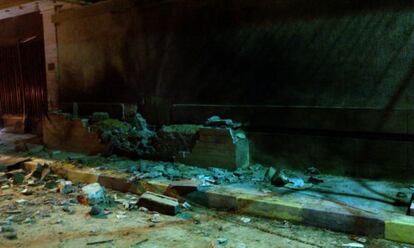Bomb thrown from car damages Spain’s embassy in Libya
No injuries reported at site that had been evacuated by Madrid last July

An explosive device was thrown at the Spanish Embassy in the Libyan capital of Tripoli late Monday, according to security sources in the city.
No one was injured in the attack but the explosive, which was launched from a passing vehicle, left a crater near an embassy guard post.
Spanish Ambassador José Antonio Borgallo and the rest of the embassy personnel were evacuated last July due to the “worsening situation” in the country caused by weeks of heavy fighting between factions.
At least two embassy guards died in a similar attack at the South Korean Embassy on April 12
“The bomb was inside a bag and was thrown from a speeding vehicle,” said one witness.
Damage was also caused to one of the building’s outside walls.
At least two embassy guards died in a similar attack at the South Korean Embassy on April 12. Korean government officials decided to evacuate its personnel following the incident.
A bomb was also thrown at the Moroccan Embassy on the same day as the Korean attack, but no injuries were reported. The Libyan branch of Islamic State (ISIS) claimed responsibility for the action.
Since the armed rebellion that toppled dictator Muammar Gaddafi in 2011, Libya has been in a state of civil war. Fighting has broken out between Islamic groups, war lords, tribal leaders and smugglers who control the capital Tripoli and the town of Tobruk where two rival governments have been set up.
On Monday, at least 13 people were killed and about 50 others wounded when fighting broke out in Benghazi between factions supporting General Khalifa Haftar, who is a supporter of the internationally recognized government in Tobruk, and different militia groups siding with the rebels in Tripoli.
As the fighting continues, representatives of the different factions have been meeting in Morocco trying to hammer out a political solution. The United Nations special representative for Libya, Spaniard Bernardino León, said Monday that it was necessary for all sides to agree to a permanent ceasefire so that a national consensus government can be formed.
Tu suscripción se está usando en otro dispositivo
¿Quieres añadir otro usuario a tu suscripción?
Si continúas leyendo en este dispositivo, no se podrá leer en el otro.
FlechaTu suscripción se está usando en otro dispositivo y solo puedes acceder a EL PAÍS desde un dispositivo a la vez.
Si quieres compartir tu cuenta, cambia tu suscripción a la modalidad Premium, así podrás añadir otro usuario. Cada uno accederá con su propia cuenta de email, lo que os permitirá personalizar vuestra experiencia en EL PAÍS.
¿Tienes una suscripción de empresa? Accede aquí para contratar más cuentas.
En el caso de no saber quién está usando tu cuenta, te recomendamos cambiar tu contraseña aquí.
Si decides continuar compartiendo tu cuenta, este mensaje se mostrará en tu dispositivo y en el de la otra persona que está usando tu cuenta de forma indefinida, afectando a tu experiencia de lectura. Puedes consultar aquí los términos y condiciones de la suscripción digital.








































